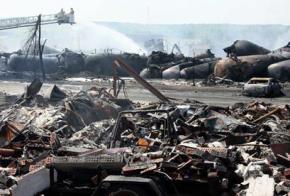Derailing oil train disasters
reports from Washington on one of numerous demonstrations marking one year since the Lac-Mégantic catastrophe--and protesting the ongoing threat.
THE RESIDENTS of Lac-Mégantic in Quebec gathered July 6 for a solemn one-year anniversary event to mark the oil train derailment and explosion that shattered their community. The disaster in the Quebec town has been followed by a surge of similar derailments on both sides of the border, highlighting another face of the ecological threat caused by a system driven by profit.
Other communities on both sides of the Canada-U.S. border held solidarity events on July 6 and the following week.
In Aberdeen, Wash., about 60 people gathered in Zelasko Park to protest planned oil train routes in their area. Members of the Quinault Indian Nation (QIN) combined with Citizens for a Clean Harbor to organize the event. A wall with pictures of the 47 people killed in the Lac-Mégantic explosion was placed in the park, and participants lined a busy adjacent street with signs protesting local oil train plans.
Aberdeen lies on the shores of Grays Harbor, and the Port of Grays Harbor adjoins the town. Last year, the oil industry announced plans to build rail loops that would receive giant oil trains with 100 or more tanker cars, with the Port of Grays Harbor as one of the proposed terminals.

The Quinault Indian Nation (QIN), which lies around 40 miles north of the port area, is very concerned about how the oil train hazard could affect some of the resources that its people depend on. An 1856 treaty guarantees the rights of the QIN to protect fish, wildlife and plant resources in areas where they have been accustomed to using. The port and the streams that flow into it are within those areas, and the harbor is a historic fishing area. The government of the QIN has issued a formal statement opposing any oil train traffic into the port.
The harbor community is generally very concerned about the direct effects of an oil train derailment. Oil extracted from shale deposits in the Bakken formation in North Dakota is known to be extremely explosive. Tar sands oil from Alberta, Canada, is less explosive, but more toxic when, refined and almost impossible to clean up after freshwater spills.
Most of the crude oil shipped by rail in the U.S. is transported in DOT-111 cars, which have been known since 1991 to be unsafe for that purpose. The DOT-111's thin metal skin and protruding valves make it too hazardous to carry flammable materials. But the growth of rail shipments of oil require hitching together 100 or more DOT-111 cars together--which concentrates the risk still more.
Aberdeen resident Gail Morehouse pointed out that there were recently three derailments in the area in the space of only 16 days. "Aberdeen's foundation is simply a mud bay, covered with backfill," Morehouse said. "It shifts daily. Houses and businesses shake regularly with every passing semi-truck."
The oil and railroad industries are promising that the shipment plan will provide many new jobs, but labor isn't necessarily buying that line. As Cager Clabaugh, president of the International Longshore and Warehouse Union local in Vancouver, Wash, put it: "Oil export terminals don't employ a lot of people...The risk isn't worth the reward--we don't believe in jobs at any cost. One accident there puts us all out of work--it' would put thousands of people out of work."
Residents of the Harbor and the Quinault Indian Nation will continue to stand in solidarity to prevent any oil trains in their area.


